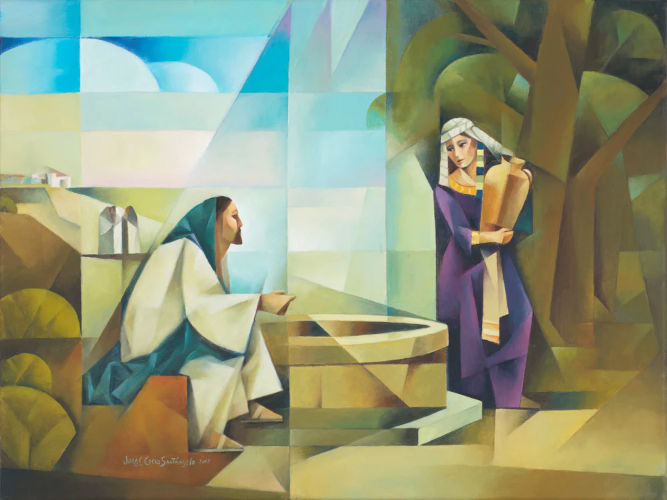
The musical “Les Miserables” gives us a song sung by Fantine. She sings a sad song to her lost youth, her lost innocence, and her lost beauty:
“I had a dream that life would be so different than the hell I am living. So different now than what it seemed. Now life has killed the dream I dreamed.”
What causes to us to identify with songs like that? What might be killing our dreams, or the dreams of someone we know and love?
Today’s first reading from Exodus, presents us with a whole nation feeling that burden, experiencing that depression, that despair. A little while earlier God had delivered these people from slavery in Egypt and now, they wanted to go back to slavery in Egypt. It only took God a few weeks to get the Israelites out of Egypt, but it would take 40 years for God to get Egypt out of the Israelites.
Our world is no different. Many people experience depression and despair that leads them to wallow in self-pity. Many of the people that I meet in the prison system experience this depression that can lead them back into slavery too – slavery to drugs, alcohol, crime, or what have you. Self-pity is powerfully addictive and the depression that it can lead to is hellish.
These ancient Hebrews were remembering the past as better than it really was. Hindsight isn’t just 20/20 vision – it’s seeing things through distorted lenses. If you don’t believe me then recall some of the memories you’ve heard expressed, maybe even by me in the narthex after church. “When I was your age, I walked to school and home again, six miles, uphill both ways.” “When I was your age, I worked 4 hours before sunrise doing chores, milking chickens.” Well, you get the picture.
Does the present look bleak to you now? Well don’t repeat the Hebrews’ mistake. The conditions you face now don’t have to be the conditions that you will face in the future. With God, things will change. Things changed for the Samaritan woman at the well in today’s Gospel.
John’s Gospel recounts that Jesus is in Samaria where he is not supposed to be but as usual, Jesus disregards the rules and regulations and loves his enemies. He is tired and thirsty, sitting by Jacob’s well – and something remarkable happens. Jesus is approached by a woman, engages her in a spiritual conversation, opens up to her in ways that he does for no one else, and completely changes her.
He asks her for a drink! He asks a Samaritan… he asks a woman… he asks the hated enemy for a drink: “If you know the gift of God, and who it is who is saying to you, “Give me a drink”, you would have asked him, and he would have given you living water.” Jesus is the real well! If we drink from Jesus we will never be thirsty again. Unlike the men who challenge Jesus, this woman is smart. She says: “Give me some of this water.”
I pray that our friends engaged in the RCIA, who are celebrating the first scrutiny at this Mass, are at the point in their lives where they are ready to proclaim: “Give me some of this water.”
This woman was remarkable, one of the greatest characters in all the Gospels. She is ashamed of something; she has a history, a reputation, but Jesus does not avoid her. He does not reject her. He starts talking to her about her life and tells her about herself. She talks to him about God, and they engage in a spiritual conversation. Notice that Jesus calls her “woman” using the same dignity that he uses towards his mother at the miracle in Cana. And then Jesus does something absolutely astonishing: He tells her who He is, calling himself “I am” – the name Yahweh gave to Moses in the burning bush. This is the only place in John’s Gospel where Jesus says that he is the Christ.
I would suggest that this is what happens to us when we pray: Jesus reveals himself to us. Jesus tells us who we are and who he is. This is what happens when we engage in spiritual conversation with each other. We recognize who Jesus is, our lives get better, and a spring of living water flows within us. We are released from the slavery of depression.
But the story is not over. The woman is completely changed because he has removed her shame, given her a new dignity, and she starts telling everyone about him.
Finally, I just want to point out that Jesus never gets his drink of water. He is still thirsty. As we move towards Holy Week, we remember that as the story nears its conclusion on the cross, Jesus is still thirsty. According to John, he dies on the cross saying “I thirst”. He is still thirsty today. He is waiting for us to give him water.
When we process in line to Holy Communion or a blessing we are on a journey, a journey toward God and toward all that He dreams we can be. That’s why churches have doors, so that we can receive here what God wants us to have and then take that into the world to make it a better place and to take God with us into our future so that we can be in a better place.
When we receive the living water, like the woman at the well, everything will be changed for us.
–Deacon Terry Murphy

